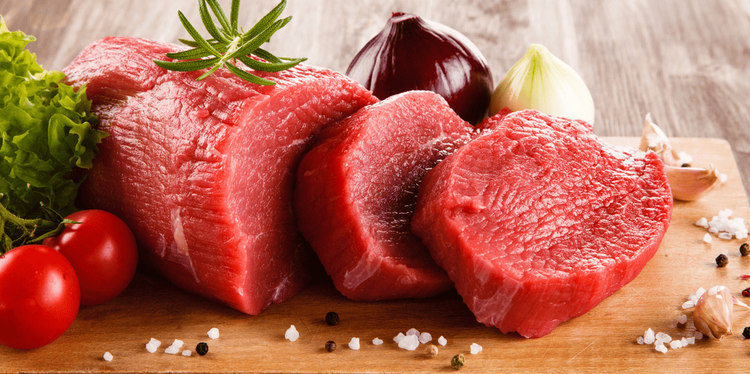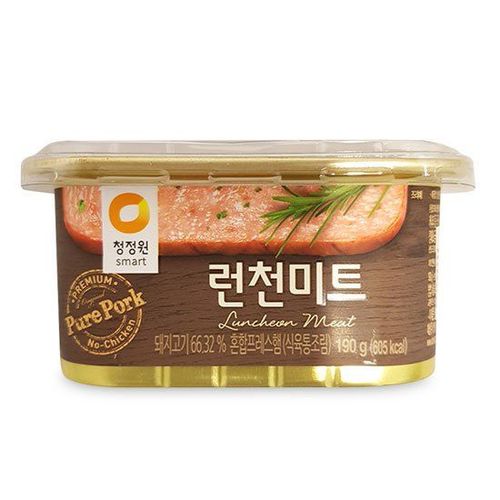This is an automatically translated article.
Preserving meat by freezing meat and keeping them in the refrigerator or freezer is a safe method. However, the time and instructions for storing frozen meat in the refrigerator and freezer are different. Refrigerated meat has a shorter shelf life than the freezer.1. Why preserve meat?
The US Centers for Disease Control and Prevention (CDC) estimates that 48 million people get food poisoning each year, including in restaurants and in private homes. In particular, it is not clear what the specific rate of food poisoning is at home, however, whatever the rate, the safe storage and handling of food at home depends on into consumers.
According to the guidance of the United States Department of Agriculture (USDA) on freezing and storing meat in particular, food in general safely, on food there are 2 types of bacteria that can grow:
Pathogenic bacteria in humans: Bacteria that cause illness in humans grow on food very quickly if not refrigerated. This type of bacteria is very dangerous and often cannot be detected by looking, smelling, or tasting food. Food spoilage bacteria: This bacteria grows on food. They change the taste and appearance of food. However, this bacterium is actually less pathogenic in humans than pathogenic bacteria. Therefore, following the rules of safe meat storage will help keep food both delicious and limit food poisoning.

CDC ước tính mỗi năm có 48 triệu người bị ngộ độc thực phẩm
2. What is safe meat preservation?
Meats including beef, chicken, pork can be stored safely and indefinitely in the freezer for the longest time.
According to USDA guidelines, freezing meat below -18°C inactivates microorganisms and slows down the activity of enzymes that cause meat spoilage such as bacteria, mold, and yeast.
No need for a vacuum sealer to freeze meat and keep it safe. However, preventing moisture will help keep food flavorful for longer when defrosting and cooking.
So, in addition to storing these foods safely in their original packaging, the USDA also recommends an extra layer of wrap or foil before placing meat in deep freezing. This extra wrap will help retain moisture and keep food fresh. Freezing meat when it's freshest also helps preserve flavor and nutrients.
Thawed meats can be safely refrozen while uncooked if thawed properly. However, according to USDA guidelines, food that has been left out of the refrigerator should not be frozen for longer than 2 hours, or 1 hour if it has been stored at temperatures above 32°C.
The shelf life of frozen meat in the freezer can be up to a millennium, but we should not keep these foods in the freezer for too long because they will have a strange smell when eaten. Freezing undercooked meat is a safe method, but at some point it just doesn't taste good anymore. Before freezing meat, review the guidelines and recommendations of the US Food and Drug Administration (FDA) and USDA regarding the storage time of frozen meat. The freezer is always the safest and longer option for preserving meat than the refrigerator.
Besides preserving, we also need to pay attention to defrosting foods properly after taking them out of the freezer. According to USDA guidelines for safe defrosting, frozen meats should only be thawed in the refrigerator or in a plastic bag when they are leak-proof and submerged in cold water. Thawing this food at room temperature allows bacteria to grow quickly.
And when defrosting those frozen meats in the refrigerator, we need to make sure they don't drip water on any other foods when defrosting. The way to store raw meat in the refrigerator also needs to be done in the same way by placing the meat on a plate and closing the lid.
In addition to the freezer, canned meat can also be preserved for a very long time, from 2 to 5 years under the right conditions. But storing canned meat in the freezer or refrigerator is more limited because the meat has been canned in a specific format.
Canning is the process that keeps food safe and does not spoil. Food is heated to kill bacteria then vacuum sealed to create a sterile environment and prevent new bacteria from growing.
In preserving meat in particular and food in general, there are very few examples that the refrigerator is a better preservation option than the freezer, especially canned food. The FDA advises skipping freezing stuffed meats and just putting them in the refrigerator before cooking.
Additionally, the USDA also says mayonnaise, cream sauces, and sauces don't freeze well. Therefore, we should not freeze prepared sauces or sauces with meat.

Bên cạnh bảo quản, chúng ta cũng cần chú ý rã đông thực phẩm đúng cách sau khi lấy chúng ra khỏi tủ đông.
3. Principles of preserving meat with the freezer
So how long does it take to store meat with the freezer, frozen meat will no longer taste good?
3.1 Beef
Most uncooked cuts of beef can be frozen for several months without loss of quality.
According to the FDA, cut beef like barbecue can be kept frozen for 4 - 12 months and steaks for 6 - 12 months. Ground beef should be frozen for 3 to 4 months.
Once cooked, those fatty leftovers can also be safely frozen. However, the FDA recommends keeping them frozen for about 2 - 3 months to ensure quality problems. Storing beef in the freezer may last longer than these guidelines, however the quality of the meat may deteriorate.

Hầu hết các phần thịt bò chưa được nấu chín đều có thể đông lạnh trong vài tháng mà không bị giảm chất lượng.
3.2 Poultry meat
Poultry such as whole chicken or turkey can be kept for up to 1 year without much loss in quality. The FDA says chicken parts such as thighs, breasts or wings can be kept for up to nine months, but other parts as well as ground chicken should not be kept for more than three to four months.
3.3 Pork
For undercooked pork, the instructions for storing meat in the freezer are the same as for beef. Fried meat can be kept frozen for 4-12 months, in the freezer for 4-6 months.
For cooked pork, the FDA recommends keeping the meat frozen for only 2 - 3 months for maximum quality.
According to FDA recommendations, bacon and processed pork such as sausage, ham or sliced meat should only be kept frozen for about 1-2 months.
4. Principles of preserving meat with the refrigerator
Storing meat in the refrigerator is not like the freezer, we need to care about both safety as well as taste. Refrigerating meat at about 4°C will slow the growth of disease-causing bacteria. Refrigerators cannot keep as cold as freezers, so we need to pay attention to the storage time limits recommended by the FDA and which foods have been kept too long should not be used.
4.1 Beef
Most uncooked and cut beef can be stored in the refrigerator for 3 - 5 days. However, ground beef should only be kept in the refrigerator for 1-2 days. Leftovers containing cooked beef should not be kept for more than 3-4 days. If it is longer, do not use it.
>>> Instructions for storing beef in the refrigerator
4.2 Poultry meat
Preservation of raw poultry including the whole or individual parts such as breast or thigh, meat or intestines can only be kept in the refrigerator for 1-2 days. Once cooked, however, the FDA says they can be kept longer in the refrigerator, three to four days.

Sau khi nấu chín, thịt gia cầm có thể được giữ lâu hơn trong tủ lạnh, từ 3 - 4 ngày.
4.3 Pork
Fresh, uncooked pork can be stored in the refrigerator for as long as other meats from 3 to 5 days, including roasts or pork chops. Raw ground pork should only be kept in the refrigerator for 1-2 days. Cooked pork dishes should only be kept in the refrigerator for 2-3 days.
How to preserve raw pork is different from processed pork. Sausages or cuts of meat in an unopened bag can keep in the refrigerator for up to 2 weeks, but once opened should only keep for 3 to 5 days for sliced meat and up to 1 week for hot dogs.
Cooked bacon, cold cuts only keep in the refrigerator for about 7 days. But whole ham can be kept in the refrigerator for 3-5 days and sliced ham can be kept in the refrigerator for 3-4 days.
5. Instructions for preserving meat when canning
In addition to preserving meat in the freezer and refrigerator, canned meat is a great option with an affordable price and a long shelf life. According to USDA guidelines, canned meat can be kept for 2 to 5 years including poultry, pork or beef.
Commercially canned meat is produced in sterile cans, vacuum sealed and heat treated at 121°C. This canning process has killed microorganisms and prevented enzymes and bacteria from entering and causing food spoilage.
However, storing meat with canned meat may cause the can to rust and spoil the meat while it is still in production. If containers are rusty or severely damaged, they should be discarded. Also, when a can of meat is swollen or has a bad smell, we need to throw it away immediately because it can be a sign of a bacteria called C. botulinum that can cause food poisoning and lead to death. . Generally, food poisoning with commercially canned meat is very rare but is possible and the risk is higher if home canned meat is produced because proper canning has not been performed.
Store canned meat at home, be sure to keep it in a cool, dry place away from light, ideally <29°C but not >38°C. Do not leave canned meat in a hot or humid place.
When opening canned meat, external bacteria begin to penetrate and grow, so unused portions should be refrigerated quickly and stored in the refrigerator. According to the USDA, we can safely store canned meat by canning leftovers and putting them in the fridge to keep their flavor, clean, and separate.
Safe meat storage requires following guidelines for properly freezing and defrosting meat, as recommended by the FDA and USDA.

Thịt đóng hộp là lựa chọn tuyệt vời với giá cả phải chăng và thời gian bảo quản lâu.
Please dial HOTLINE for more information or register for an appointment HERE. Download MyVinmec app to make appointments faster and to manage your bookings easily.
REFERENCES: healthline.com













